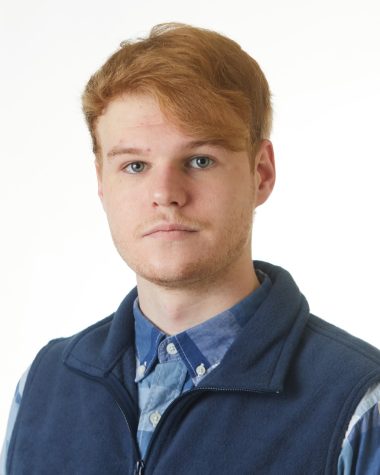Student Association president and vice president candidates debate on issues at UWL and in the community
April 8, 2022
On Thursday, April 7, there was a debate for the 2022-2023 Student Association (SA) presidential candidates. On Tuesday, April 14, there will be general elections for the SA president, vice-president, and senators.
The candidates running for next year’s term include Grant Mathu (president) and Siri Flores (vice-president). Since there were only two candidates this year, Mathu and Flores answered questions about themselves and their plans for their roles. Some of the topics that were covered include mental health, environmental sustainability, and division.
The candidates began with their personal statements, and Mathu said, “I’m a third-year student here, a political science and public administration major. I’ve been involved in student government the last two years. 2020-21, I was in the executive cabinet, and then this last year, I’ve been on the student court, and then outside of campus, I have been a La Crosse County supervisor since 2020…But just aside from experience, the reason why Siri and I are running is because we just have solid policy priorities.”
Candidate Flores followed with her personal statement, and she said, “I’m from Madison, WI, originally. I’m a sophomore, and I’m double-majoring in psychology and English. I have not had much experience in student government aside from my position on the student court this year–I also have a position on the Student Misconduct Hearing Committee. Outside of student government, I spend a lot of time working. I have two on-campus jobs, one of them being the career services intern with a multicultural focus, so I primarily work in OMSS acting as the career services representative…I also work for the Center for Transformative Justice.”
Flores went on to say, “I’m really excited to be a part of SA as a vice-president because I know I have a lot of drive to get things done, and I dream big, and I like to see it through.”
Question 1: Please tell us why you ran for president (or vice-president) and what makes you feel like you are qualified.
Mathu: “Siri and I kind of decided to run because there are three main areas on campus that I think deserve more attention. Mental health, for sure. I think with the events of the past couple of years, the pandemic, and then just increased issues on campus, we’ve got to see a stronger outreach from student government, whether that’s creating an ad hoc mental health committee or just trying to engage better with the student body and try to build a community on-campus–that’s a major priority for us.
The second thing I would say is just making progress in the area of environmental sustainability. Our university is one of the only ones in the entire system that doesn’t have a sustainability coordinator hired on a full-time basis. Again, another thing Siri and I will both work towards.
And then, I would say the third issue is just improving student life on-campus in general, whether that’s not having five people live in converted study rooms as dorms any longer or whether that’s just having a better-negotiated dining services contract I think. Again, those are the three major areas that Siri and I are looking to work on.”
Flores: “I wanted to run because I always like to find the cracks in things and do what I can to fix them. In high school, when COVID-19 happened, I was a senior, and I realized there were a lot of inequalities for students at home, and they were unable to produce the same amount of work they were producing when they were at school every day with those resources. So, I started a petition for pass/fail grading, which I was, in turn, hoping would kind of level the playing field a little bit more. I went on the news and got it passed, so I definitely have a lot of experience working with students on the ground with that petition, but also in my position in career services.
So, I really genuinely do care about the well-being of everyone, and I do what I can in my power. I understand that I do come from privilege, and I use that privilege to help students that don’t necessarily come from the same background as me. What makes me qualified is, I, again, know a lot of people, and I put myself in situations where I can hear actual stories and learn what goes on–and not just at the good thing, but at the bad things and what we can do to improve it.”
Question 2: What is one thing you would like to do in your position, and how do you propose you would accomplish that goal realistically?
Mathu: “Trying to just build engagement is probably the foundational message and issue that we’re trying to hit on. Right now, in the room for this debate, there are only fifteen people, and there are only two people running for the top positions in the SA, so I think there’s objectively a bit of an engagement problem. There are also some seats in the student senate for which there aren’t candidates running, so I think trying to actually get out there and get freshman students and people coming to campus for the first time in the fall of next year to understand and be aware of SA is something Siri and I are going to work on. Whether that’s the both of us going to orientation or start dates and trying to just plug for SA’s existence and to get people involved in it, or whether that’s just trying to change our social media outreach strategy.”
Flores: “My biggest priority is mental health. I am no stranger to mental health issues, I know a lot of students on campus aren’t either, and just I don’t think there are enough resources out there to help students. For example, in counseling and testing, there’s a lot of emphasis right now on group therapy…I personally am not comfortable with that, and I know a lot of students aren’t either, so putting more resources towards counseling and testing as an entire office in hopes there will be more room to grow individual therapy.”
Question 3: What is your experience working with the student senate?
Mathu: “As I said, in 2020-21, I was in the executive cabinet, which meant that I didn’t have full speaking rights or voting rights in the student senate, but I had to attend every meeting that year and update the student senators as to what I was doing and as to what the cabinet was doing. And then, in terms of student court, I would say there’s a little less interaction between the court and student senate…I have tried to attend a lot of meetings this year and just get a little more involved in student senate, and I think Siri has done the same.”
Flores: “I have been on student court for the last year. I got appointed last May, so we haven’t really done much–that role hasn’t really grown. We are on the Student Misconduct Hearing Committee as of this semester, so I haven’t had much experience with student government. However, I do think that is a strength because maybe it’s time we need a new set of eyes who isn’t used to the same ceremonies and traditions that we currently have.”
Question 4: Being president is a full-time commitment and will require at least twenty-five hours of your week. Please explain how you will manage your time and keep yourself accountable so that you can accomplish your goals.
Mathu: “I think I’ll be able to do a decent job balancing it because I have, for the past couple of years, been able to balance being a county supervisor with being a student. I think both of those are really, decently intensive roles. I think if I can do that, I can do this as well.”
Question 5: What experiences do you have working with the current or former administrators that will benefit you in this role?
Mathu: “I’ve definitely interacted with the provost, with some of the deans and vice-chancellors, but overall, I do think that within the first couple weeks of getting elected, if we’re lucky enough to get elected, just reaching out to and meeting with them is probably something that’s really at the top of our priority list just so we can build those relationships.”
Question 6: How will you support the president and create a positive working relationship with the president while effectively communicating in order to properly represent the student body?
Flores: “I love working with students and being that voice for them, and that’s essentially what I do in career services right now. I am the bridge between the students and that office as a whole. So, Grant knows I’m a very social person, and that’s partially why he brought me on…I think that my personality and the skills I’ve had since I was about two years old are definitely going to help us out.”
Question 7: You will have many legislative responsibilities, including serving as the president of the student senate. What qualifications do you have for this role?
Flores: “I see myself as a good moderator. I have a big family…I have had to make compromises, I have had to work with difficult people in different jobs. So, I think with my experience in my home but also teaching swimming lessons, nannying, working with people bartending, career services, working with actual professions–I think all of those different environments have given me a skill set that I am able to work with people my own age all working towards the same goal.”
Question 8: Diversity and Inclusion are very important to UWL’s campus. How will you make this a more safe and inclusive space for students with marginalized identities?
Mathu: “We only have fifteen people here showing up to the debate. We’re not getting the diversity of opinion, we’re not getting the diversity of lived experience or diversity of background…SA has done a very good job of advocating for people of diverse backgrounds, and I think we’ll just try to continue that.”
Flores: “I am a woman of color, and I’m not going to say that I understand the experiences of every single human on earth…To me, it’s really important to make sure that everyone has a voice, and I want to represent the people that don’t feel like they do have a voice.”
Question 9: Our community has seen a whole lot of hate and division. How will you work with UWL’s campus together when racism, discrimination, and hate divide us?
Mathu: “An important part of that will just be getting the administration on board with listening to some of the student senators…Certain administrators would really rather not do that, so I think we’re going to work to make sure that administrators actually take the concerns of students, particularly students with diverse backgrounds and multicultural and marginalized students, seriously and that they listen to them.”
Flores: “If we start implementing a forum for students to be able to discuss [division] with people of administration who do have these powerful positions–kind of breaking down that dynamic would definitely be helpful in making sure everyone’s voices are heard and kind of coming towards a community goal.”
Question 10: How do you plan to make our campus more sustainable? Please share one realistic goal you have and how you will achieve it.
Mathu: “I think a realistic goal right now is to try and push for a full-time, or at least a part-time sustainability coordinator…We’re going to need people in charge of SA who are willing to push for it and willing to maybe even compromise.”
Flores: “We were in talks about building a community garden, so that would serve the purpose of, again, building community, having access to food…I also think that that does bring in a piece of education to be able to teach students, hands-on like these are sustainable practices, this is how you can bring these things home.”
Question 11: What do you want to do in your role to help improve the mental health of students on campus?
Mathu: “We need a strong on-campus community if you’re going to make people feel like they have an actual support structure…We need a SA that can make the administration give a damn about people’s mental health, and an administration that’s going to fund the counseling and testing center, like Siri was saying.”
Flores: “Wellness weekend that we had last fall was a good start, but not necessarily where we could be, so making sure that the students get the breaks they deserve…Maybe extending wellness weekend to another day or adding another day to fall break, or don’t make finals go up until a day before Christmas.
Question 12: A sense of community is extremely important. How will you communicate between faculty and staff, considering that faculty struggle with their mental health as well?
Mathu: “In terms of just reaching out to faculty, it seems like a lot of that, at least in terms of the presidential and vice-presidential roles, is done in more private one-on-one meetings with administrators…I think it would be good for student senate to pass more resolutions that are directly aimed at being sent to faculty senate and kind of increasing more, I would say, formal or official communications with them.”
Flores: “I really think that it boils down to effort–making sure that we put the effort into actually speaking to faculty and making sure that their voices are heard and not just focusing on student’s mental health, although it is very important.”
Question 13: What is something that you would change or add to UWL’s mental health resources on campus, and how do you plan to do that?
Mathu: “Trying to advocate for the administration to put more money towards [counseling and testing] is probably the main contribution I think that we could make.”
Flores: “Counseling and testing doesn’t need to be the only ones looking out for the mental health of students, so creating campus-wide policies, campus-wide resources, making things more known and available to students.”
Question 14: How do you plan on advocating for campus safety? What are some specific goals that you have?
Mathu: “There’s a plan that’s going to be set in motion over the summer, I believe, to put up some cameras on campus, particularly in areas where cash is being handled…I think it’s important that we try to actually get the administration to put cameras in places where crime and assault would be more likely to happen–parking ramps, for instance, and near the borders of campus.”
Flores: “We should put up a border of lights around campus just so some of the surrounding area is well lit as well as the outside of campus…I think we should up our self-defense [classes] and offer more to students.”







